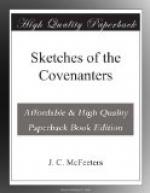The Covenanters, ever loving peace and hating war, had exhausted all honorable measures to avoid a conflict with their king on the battlefield. Their efforts however having failed, again the call to arms resounded through their peaceful glens and over their granite hills. The shepherd again left his flock, the workman closed his shop, the plowman released his team, and the minister took leave of his people to follow the fiery war-cloud. Again the banner was unfurled for Christ’s crown and covenant; the silken folds rose and fell on the breeze; the golden letters and sacred motto flashed upon the eyes of the men who were willing to follow where it led. Gen. Leslie was again in command. He boldly crossed the Tweed and hastened to give the king battle on English soil. The armies having come within range of each other, the usual lull before the battle ensued. The Covenanted columns, standing under their colors and gleaming with arms and armor in the bright August sun, struck terror once more to the king’s heart. He dreaded to meet this sea of living, fiery valor, rolling its waves into his very camp. He saw, as on the first occasion, that a treaty was the better part of valor and offered peace. The terms being concluded, the Covenanters returned to their homes, not knowing how long the peace would last.
England, too, was at this time greatly agitated. She was making a desperate effort to throw off the galling despotism of King Charles. The spirit of progress, enlightenment, and liberty was deeply stirring the people; they were eagerly reaching after a higher and nobler life. The grand possibilities of improvement and happiness filled them with visions of better things, and they grew desperate in their purpose to obtain freedom. Continued subjection to the heartless autocrat became intolerable.
There was public indignation likewise against Prelacy, for by it the king was inspired and upheld. In the State the revolt was from monarchy to democracy: in the Church, from Episcopacy to Presbyterianism. The king, as the head of the Episcopal Church, not only exercised jurisdiction over her, but used her as an instrument to enforce his arbitrary will over the people. The king mounted his war horse once more. This time it was English against English. Strong armies were mustered on each side. For four long years a civil war swept the unhappy kingdom, victory perching alternately on the opposing banners. This was a war of the Parliament against the king, British rule against brutish rule, humanity against despotism. Scotland watched the struggle of her sister kingdom with deepest interest. On the one side she was attached to her king, notwithstanding his incorrigibleness; on the other, she was devoted to the principles involved, including the independence of the Church.




